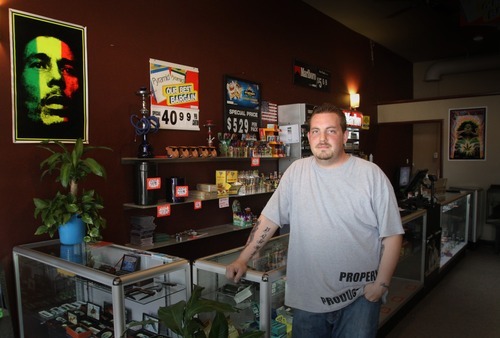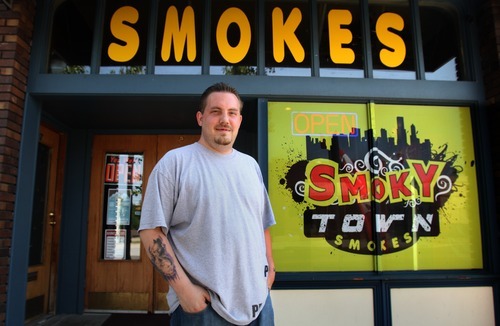This is an archived article that was published on sltrib.com in 2012, and information in the article may be outdated. It is provided only for personal research purposes and may not be reprinted.
The crackdown on sales of synthetic marijuana products, often called "spice," is expected to gain additional emphasis Tuesday in unincorporated areas of Salt Lake County.
An ordinance set for adoption at the County Council's 4 p.m. meeting requires owners of unincorporated-area "smoke shops" to obtain a tobacco specialty business license. It also establishes grounds for revoking that permit for violations such as selling tobacco to minors or outlawed products like spice.
"This helps business license people work with law enforcement to make sure the ordinance is enforced," County Councilman Steve DeBry, a deputy chief in the Unified Police Department, said last week when the ordinance first was considered at a council work session.
DeBry noted that the Utah Legislature passed a bill last session, House Bill 95, that outlawed spice and other chemically augmented substances that mirror some of the effects of marijuana. The county's ordinance makes that law applicable at the local government level, where law enforcement officers have found that some smoke shops are still selling spice, figuring profits from sales more than offset fines for occasionally getting busted, he added.
But by making a shop's business license subject to suspension or revocation for offenses, DeBry said, "the bad actors who are violating the law will lose their licenses. The good actors who are abiding will be fine. Nothing will happen to them."
For that reason, the ordinance appeals to Kody Bowman, owner of Smoky Town Smokes, 9117 W. 2700 South, in Magna.
"This will level the playing field for all of us to do business," said Bowman. "It's awesome if it hits people selling products they shouldn't be selling, the ones trying to use the loophole to get by. That kills other businesses that obey the law."
But Von Fugal, who spoke at the council's meeting last week, pleaded with county officials to not be too draconian in enforcing the law.
"Do what you can to soften this blow," said Fugal, who did not claim an affiliation with any smoke shop but added that these businesses provide jobs throughout the unincorporated county. It's not right, he added, to penalize these businesses just for dealing in products inconsistent with the dominant culture's aversion to tobacco.
"I'm a practicing Mormon and I have my vices. I drink Dr. Pepper. I know I need to look at that," Fugal said. "We don't need to be passing down laws from above to help people with their vices."
The ordinance applies to businesses in which sales of tobacco products account for more than 35 percent of total annual gross sales. It adopts state provisions that keep smoke shops from being close to schools, libraries, youth centers and parks.
Salt Lake County has several specialty business licenses, said county Planning and Development Director Rolen Yoshinaga. Others involve sexually oriented business, alcohol servers and door-to-door sales in residential areas.
He said Monday that his office has not received any complaints about the ordinance creating the tobacco specialty business license.
mikeg@sltrib.comTwitter: @sltribmikeg





